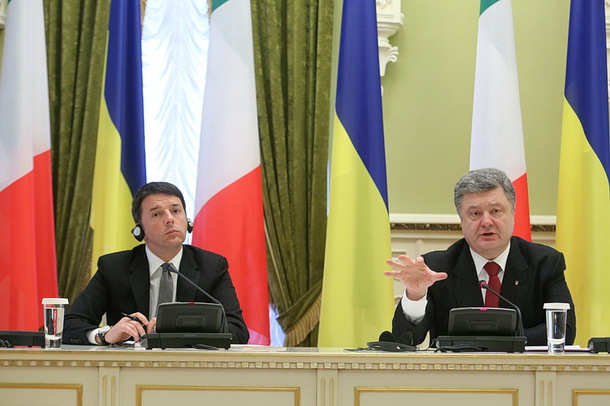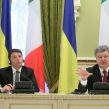
Italy Caught in Ukrainian Dilemma
Publication: Eurasia Daily Monitor Volume: 12 Issue: 88
By:

Pressed by economic and geopolitical imperatives, Italy is trying to carve out its own diplomatic space over the crisis in Ukraine, in an apparent attempt at fostering a rapprochement between the European Union and Russia. The Russian annexation of the Ukrainian autonomous region of Crimea in March 2014, as well as the Kremlin’s ensuing incitement of and involvement in the war still raging in the heavily Russophone east and south of Ukraine, prompted EU member states, along with the United States, to impose a raft of economic and financial sanctions on Moscow.
On May 6, during a meeting in Kyiv with the Ukrainian leadership, Italian Foreign Minister Paolo Gentiloni said clearly that Rome supported Ukraine’s sovereignty and territorial integrity. However, at the same time, he called on Ukrainian leaders to fully abide by the Minsk Protocol. The ceasefire agreement signed in Minsk was brokered in February by Germany, France and Russia to halt the conflict pitting the Ukrainian military against the Russia-backed separatist forces in the country’s eastern region of Donbas, which encompasses Donetsk and Luhansk provinces (Agi.it, May 6).
Gentiloni’s statement in the Ukrainian capital city echoed the words that Italy’s Prime Minister Matteo Renzi had pronounced two days earlier at the Milan Stock Exchange: “On one hand, Russia must respect Ukraine. On the other, it is unthinkable that Europe and Russia return to the Cold War climate” (Ansa, May 4).
In his discussions with Ukraine’s President Petro Poroshenko and Foreign Minister Pavlo Klimkin, Gentiloni added that part of the Minsk peace process was Kyiv’s obligation to grant some form of autonomy to the Donbas region. According to Rome, the Ukrainian government could look to Italy’s autonomous Alpine region of Trentino-Alto Adige, where German-speaking inhabitants are in a majority, as a model for the rebel-held territories of Donetsk and Luhansk (TASS, February 11).
Italy is eager to end the sanctions regime applied to Russia for two reasons: First, the Italian economy paid a heavy price since Washington and Brussels imposed hard economic and financial restrictions on Moscow and the Kremlin enforced a ban on imports of many foodstuffs from the US and EU in response. Second, a sanctions-free Moscow could help Rome protect its core geopolitical interests in the Mediterranean.
Russia is still the largest oil and gas supplier to Italy, but their bilateral trade turnover is shrinking considerably, while competitors from China, India and Turkey heavily buy into the Russian market. In 2013, Italy was the second-biggest European exporter to Russia, at $12.1 billion, with Germany ranking first, the Italian employers’ federation Confindustria reports. Due to sanctions, this amount dropped to $10.8 in 2014, with an expected loss of $3.4 billion in 2015 if restrictions are prolonged (Agi.it, April 27).
The Italian business community calls for avoiding the imposition of any further sanction on Moscow and for existing restrictions to be eased, if not completely lifted. For Italy’s private sector, the EU and Russia should find means other than financial and economic penalties to project their respective diplomacies.
In the opinion of some Italian leaders, a thaw in relations between the EU and Russia has the potential to serve both Italy’s security policies and Europe’s now tarnished diplomacy. For Rome, Moscow could be a valuable card to play in the current quagmire in Libya, which sees two rival governments—one in Tobruk, in the country’s east, and the other in the capital city Tripoli—claiming power.
Over the past few months, Russia has developed a close relationship with the Egyptian government that, in turn, has strong influence over the internationally recognized Libyan cabinet in Tobruk. Rome is keen to achieve a solution to the civil conflict in Libya so as to stop criminal networks smuggling African and Asian migrants into southern Italy from the Libyan shores and prevent jihadist militias linked to the self-proclaimed Islamic State (IS) from advancing across the North African country.
So it should have come as no surprise that Italy downplays the importance of the much-trumpeted Sino-Russian joint naval drills in the Mediterranean. Rome believes that Moscow is a key element in stabilizing Europe’s neighbourhood, not least with regard to the civil war in Syria, negotiations on the Iranian nuclear program, or the fight against terrorist organizations (Esteri.it, May 3).
On the other hand, the Russian leadership is well-aware that the Italian government is caught between two fires, as Rome must uphold the EU-sponsored sanctions that it would rather lift. Russia’s ambassador to Italy, Sergei Razov, did not mince words when, in February, he said that restrictive measures imposed on Russia by the EU went against Italy’s national interest, and that many politicians and entrepreneurs in Italy shared his position (Sputnik News, February 9).
On the security front, early in March, Russian President Vladimir Putin and Prime Minister Renzi talked in Moscow of the deteriorating situation in Libya. The Russian leader urged a diplomatic solution to the crisis under the mediation of the United Nations (TASS, March 5).
Putin’s courting of Italy appears to be part of his attempt to break apart the Euro-American siege against Russia and thwart the Euro-Atlantic community’s politics toward Ukraine. Much like for cash-strapped Greece and Cyprus, the Russian president knows well that he can exert leverage on Italy’s need to revive its stagnant economy; export is just about the only component of Rome’s GDP that has been holding out against the economic crisis. And the same goes for Italy’s priority of protecting the country’s porous maritime borders between Sicily and Libya from massive immigration flows and possible infiltrations by militants.
In its effort to strike a balance between doves and hawks within the EU over the Russian intervention in Ukraine, Italy is walking a thin diplomatic line. This situation exposes Rome to inevitable criticism, such as that of Kyiv’s ambassador to Italy, Heorhiy Chernyavskyi. The Ukrainian diplomat lodged a formal note of protest to Foreign Minister Gentiloni on April 28, after an official from the Italian Ministry of Economic Development suggested that sanctions against Russia would be lifted in the near future (Ukrainska Pravda, April 29).
Veiled disapproval came also from Washington after Renzi’s modest overtures to Putin in March. But the US government is confident that ultimately, Italy, as well as the other EU countries, will stick to their commitment to extend the sanctions on Russia when they expire in June. Daniel Fried, the chief co-ordinator on sanctions at the US State Department, expressed this sentiment in early April (America24, April 7).
Paraphrasing the late Austrian-British philosopher Ludwig Wittgenstein, an honest broker is like a tightrope walker. And in trying to balance between the Kremlin and the Euro-Atlantic bloc over Ukraine, Italy increasingly looks as though it is walking on nothing but air.




